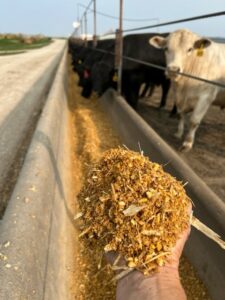When winter arrives, we aren’t the only ones bundling up to stay warm. As a dairy farmer, I want you to know we pay special attention to the health of our baby calves during harsh weather to make sure they are protected sufficiently from the elements. Their bodies are still learning to adjust to the changing temperatures. One easy way we do this is by utilizing calf blankets to help them retain body heat. Adorable? Yes. Useful? Absolutely.

We take special precautions with mama cows and their newborn calves in winter. We carefully watch the cows that are close to giving birth because we need to be able to move the calf somewhere warm immediately!

When a calf is born, we do two things to help her get the best possible start. First, we make sure she is in a warm and safe place. Next, we make sure that the calf gets colostrum–or “first milk.” Colostrum is vital to ensure calves have a great and healthy start to their lives by providing them antibodies to build up their immune systems.

We, like many dairy farms, use hutches for our calves. Hutches are individual shelters that provide each calf with her own space. This allows us to watch each calf carefully, monitor her eating and reduce the risk of her catching an illness from another calf. It is our job to keep her warm, dry and comfortable while in her hutch.

One of the most important and basic things on our farm is for our cows to have access to nutritious feed and water 24/7. We feed our cows total mixed ration (TMR), a combination of grasses, grains and other ingredients — such as soybean meal and distillers grains, by-products from corn and soybean processing — to give them the right balance of nutrients. They get a new TMR batch every 12 hours to ensure the feed is fresh and to keep them eating.

We also work frequently with cow nutritionists to make sure our cows have a balanced diet. These experts understand the science behind feeding dairy cows. They create the right diet for different stages of a cow’s life and will test our feed to determine the nutritional value of each batch. It may not look like it to you, but this ration is a balanced diet of different ingredients prescribed by the nutritionist.
No matter what time of year it is, we work to make sure all cows, from the babies to the milking cows, have access to plenty of clean, cool water 24 hours a day. A small task, but so important, because a dairy cow can drink up to 50 gallons each day! Winter can cause problems providing water to our cows. The frigid temperatures can cause the water equipment to freeze up. We have to constantly check to make sure they are thawed and if needed we use a heater to thaw them.

As you can tell from my descriptions of our tasks as dairy farmers, our most important job is the welfare of our cows. We monitor them closely by watching for changes in their daily feed/water intake, activity or behavior. After working with cows for most of our lives, we can usually pick up on signs that could mean a cow isn’t feeling her best. If we do pick up on any of those signs, we then begin the process of determining the issue, which may require calling our veterinarian.

No matter what season we find ourselves in, we really work hard to make sure our cows are clean, well cared for and comfortable. We know that in order to produce high-quality milk for your family and mine, it all starts with the care we provide for our cows.



